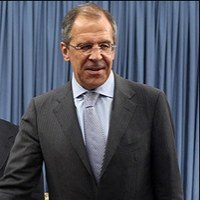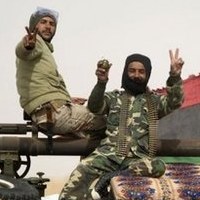Published: may 06, 2010; Ahmadinejad Unveils His Grand Strategy: A Nuclear Defensive Umbrella For Aggression.
By Barry Rubin,
Whatever you think of Iranian President Mahmoud Ahmadinejad he is not a stupid man. And he’s also not acting like an intimidated one. During the latest UN meeting on nuclear issues, when the new International Atomic Energy Agency (IAEA)director-general urged Iran to “clarify” its activities, the camera showed Ahmadinejad laughing contemptuously.
Diplomatic engagement isn’t going to win this guy over, nor are hollow threats. He knows the current U.S. government court-martials Navy Seals for giving a bloody lip to a terrorist who murdered American civilians in Iraq and mutilated their corpses (though the two tried have been cleared). What does he have to be scared about?
The main theme of Ahmadinejad’s speech at the 2010 Review Conference by countries that have signed the Non-Proliferation Treaty (NPT) is to outflank Obama’s calls for getting rid of nuclear weapons, trying to repeat Iran’s success of last September in getting sanctions postponed. Back then, Iran proposed a plan for letting its nuclear materials be reprocessed abroad. But once the sanctions’ momentum had been derailed, Iran made clear that it had no intention of agreeing to anything like that.
Incidentally, it was Obama who strongly supported adding the issue of getting rid of all nuclear weapons in the world to the UN conference agenda.
Afer running his own international nuclear summit under the slogan, “Nuclear Power for All, Nuclear Weapons for None,” Ahmadinejad gave a UN speech sounding word for word what an idealistic pacifist would say: nuclear weapons are bad; ban them now.
Nuclear weapons, Ahmadinejad explained, don’t bring real security and producing or possessing them, “under whatever pretext..is a very dangerous act which first and foremost makes the country” having them worse off. He even stated:
“The possession of nuclear bombs is not a source of pride; it is rather disgusting and shameful. And even more shameful is the threat to use or to use such weapons.” The entire system of non-proliferation, said Ahmadinejad, is just an oppressive sham letting those who possess these weapons try to keep others from getting them in order to maintain their own supremacy. Those in control of the international system also, he continued, want to use nuclear arms as an excuse to get others from obtaining nuclear energy, “the cleanest and cheapest” source of power.
Ahmadinejad’s alternative is, “Immediate termination of all types of research, development, or improvement of nuclear weapons and their related facilities” and dismantling all U.S. nuclear weapons everywhere.
Oh, yes, and he calls for reforming the UN Security Council to get rid of a veto or permanent membership for the United States and others. And–no stranger to chutzpah–Ahmadinejad called for kicking the United States off the board of governors of the International Atomic Energy Agency.
At the end, Ahmadinejad invited Obama “to join this humane movement, if he is still committed to his motto of `change.’”
What is all this about? Why is the leader most determined to pay a high price for getting nuclear weapons bad-mouthing them. Is this just camouflage to buy more time for Iran to get nukes? Yes but that’s not all.
First, Ahmadinejad is calling Obama’s bluff. You want to eliminate nuclear weapons? Make my day, let’s do it! Obviously, this isn’t going to work at this stage on Obama. But Ahmadinejad is not trying to persuade the United States but rather a range of Third World countries that might well oppose sanctions, including Lebanon, Turkey, and Brazil, which all happen to be on the Security Council right now and whose votes will be vital for passing (or, more likely, not passing) sanctions.
What’s most important of all, however, is the second motive, an Iranian strategy I call creating a defensive umbrella for aggression. This might become the centerpiece of Middle East politics in the future. Let me explain.
Most discussion in the West has focused on Iran using nuclear weapons or threatening to do so. Yet, instead, Iran could genuinely be developing these arms in order to defend itself. The problem is that this defense is coupled with an aggressive policy.
In this framework, Iran would continue and escalate its subversive efforts against neighbors; consolidate and increase its influence in Lebanon and Iraq; support Hamas and client forces in Afghanistan; press regional states toward appeasement; recruit millions into revolutionary Islamist groups; and try to make Iran the hegemonic power in the region.
But when anyone tries to oppose Iran, Tehran need merely give a gentle reminder that it has nuclear arms and so they better shut up. To be fully intimidated by this tactic, Arabs don’t have to believe that Iran would win a nuclear exchange with the United States. After all, even if Tehran lost they know their own countries would be devastated. Better to avoid any chance of a nuclear war than to offend Iran. Syria and Turkey, under its neo-Islamist regime; Hamas and Hizballah; Yemeni rebels and Iraqi insurgents would smirk and stick out their tongues from under Iran’s protective umbrella.
The other element—as so often in the Middle East—is who the local rulers most fear. How can the Obama Administration, which has criticized past U.S. use of force and decisive leadership, persuade Iran to tremble in fear and convince moderate Arabs to stand tall feeling securely protected? Of course, these Arabs will accept American security guarantees but they would then be far more likely to bow to Iranian demands than to U.S. requests.
And there’s still another trick up Ahmadinejad’s sleeve. Under the current administration concept of containing Iran, the United States would have to do precisely what Ahmadinejad proposes to outlaw: threaten Iran with nuclear retaliation. So how will a U.S. threat that keeps nuclear Iran from flexing its muscles be worded, how scary will it be for Tehran, and how encouraging will it be for that regime’s intended victims?
Ahmadinejad’s apparently pacifist-style, peacenik stance at the UN conference fits into his strategy. Nuclear weapons may well provide the umbrella for him to seek regional hegemony with weapons of mass destruction unused but highly visible in his back pocket.
For a detailed analysis of what’s going on regarding current non-proliferation issues, read Josh Pollack, a serious expert on these issues who actually makes them comprehensible, go Here.
About the author,
Barry Rubin is director of the Global Research in International Affairs (GLORIA) Center and editor of the Middle East Review of International Affairs (MERIA) Journal. His latest books are The Israel-Arab Reader (seventh edition), The Long War for Freedom: The Arab Struggle for Democracy in the Middle East (Wiley), and The Truth About Syria (Palgrave-Macmillan). His new edited books include Lebanon: Liberation, Conflict and Crisis; Guide to Islamist Movements; Conflict and Insurgency in the Middle East; and The Muslim Brotherhood.



 RSS
RSS











Is Iran Creating a Defensive Umbrella for Aggression? #iran #us http://j.mp/bVZ4AT
RT @CrethiPlethi: Is Iran Creating a Defensive Umbrella for Aggression? #iran #us http://j.mp/bVZ4AT
[…] This post was mentioned on Twitter by Elisabeth, Crethi Plethi. Crethi Plethi said: Is Iran Creating a Defensive Umbrella for Aggression? #iran #us http://j.mp/bVZ4AT […]